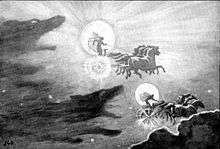Jötunheimr
In Norse cosmology, Jötunheimr (or Jǫtunheimr in Old Norse orthography; often anglicized as Jotunheim or Udgård) is a location associated with the Jötnar, entities in Norse mythology.
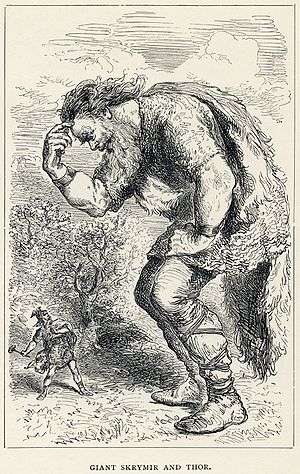
by Louis Huard.
Legend
From Jötunheimr, the giants menace the humans in Midgard and the gods in Asgard. The river Ifing (Old Norse, Ífingr) separates Asgard, the realm of the gods, from Jötunheimr, the land of giants. Gastropnir, the protection wall for the home of Menglad, and Þrymheimr, home of Þjazi, were both located in Jötunheimr, which was ruled by King Thrym. Glæsisvellir was a location in Jötunheimr, where lived the giant Gudmund, father of Höfund. Utgard was a stronghold surrounding the land of the giants,[1] but in Nordic languages, “Jötunheimr” is also simply a name for the realm of giants (Jötun).[1][2]
Territories
Gastropnir
The protection wall for the dwelling of Menglöð[3]:80, lover of the human Svipdagr.
Mímir's Well
Located under the second root of the world tree Yggdrasil in Jötunheim, guarded by the jötunn Mímir. The well is the source of Mímir's wisdom. Odin, wanting to possess great wisdom, journeys through the land of the giants to acquire it.
Þrymheimr
Often anglicized as Thrymheim, it was the home of the jötunn Þjazi (anglicized as Thiazi). Þjazi once tricked Loki into aiding him on kidnapping Iðunn, the goddess who grants magic apples of youth to gods. This act would be the cause of Þjazi's death.
Útgarðar
Útgarðar (often anglicized as Utgard) is the capital of Jotunheim, serving as the stronghold of the giants. Útgarða-Loki, also known as Skrýmir, rules the place. The god Thor challenged him, only to get fooled by the trickster giant who then disappeared.
Events within Jötunheimr
How Menglöð Was Won
Svipdagr was given a task by his stepmother to woo the maiden Menglöð. He summoned his mother, Gróa, a völva in life, to seek her advice on how to woo the maiden Menglöð. Gróa cast a series of charms to protect him on his quest. Upon arriving at Jötunheim, Svipdagr is blocked by a castle gate guarded by the jötunn Fjölsviðr,[3] who dismisses him before asking for his name. Svipdagr, giving a false name, answers a series of questions, in which he learned about the castle, its residents, and its environments. Svipdagr learns that the gate will only open up to one person: Svipdagr. The gates opens when he reveals his identity, where he is met by his expected lover, Menglöð.
How Thor Killed Geirröd
The popular myth of how Thor killed the jötunn Geirröd has many variations, but all of them are caused by the trickster god Loki. Donning a suit of falcon feathers, Loki paid a visit to the jötunn's castle. When Geirröd saw the falcon, he knew right away that it was not a real falcon. Locked in a cage and starving, Loki revealed his identity. Geirröd released him on the condition that he bring Thor without his hammer to his castle. Loki readily agreed.
Back in Asgard, Loki openly discussed the giant's eagerness to meet Thor to introduce his two beautiful daughters[3], Gjálp and Greip. Simple-minded Thor couldn't resist the temptation of meeting beautiful maidens. He agreed to Loki's suggestion of leaving his hammer behind. On the way to the castle, Thor and Loki had to stay overnight with a gentle giantess, Gríðr, who warned Thor of the danger Geirröd possessed. The giantess lent him her belt and her magic staff.
Seeing the giantess Gjálp causing the water on Vimur river to rise, Thor used the magic staff to escape drowning, and then threw a rock at the giantess who fled. Thor and Loki arrived at the castle, where he was placed in a room with one chair. Weary from the travel, he sat down and closed his eyes. All at once, Thor was closing in on the ceiling. He thrust Gríðr's staff against the roof beam and pushed down. With the heavy weight and force of their guest, the giantess sisters, Gjálp and Greip, were crushed to death[3].
Thor, displeased with everything that had happened, went to confront Geirröd. The giant raised his hand and threw a hot lump of iron at the thunder god. Using the iron gloves lent to him by Gríðr, Thor caught the hot iron and threw it back at the giant who hid behind a pillar. The hot ball went straight into the pillar, into the head of Geirröd, and finally rested deep into the earth.
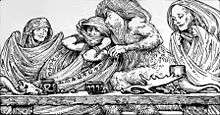
How Thor Lost His Hammer
Thor, the god of thunder and storm, once lost his hammer, Mjölnir. With the loss of the mighty weapon, the only absolute defense of the Aesir against the giants, Asgard would be in much danger. Thor's angered shouts were heard by the trickster god, Loki, who knew that he must help this time. Thor and Loki sought out Freyja, a beautiful goddess, to borrow her suit of falcon feathers[4]:1. Putting on the feathered coat, Loki flew to Jötunheim.
Loki met the king of the jötnar, Þrymr (often anglicized as Thrym), who had admitted to the theft of Thor's hammer. Mjölnir was hidden deep beneath the earth.[5] Loki flew back to Asgard and relayed the information to Thor. The gods convened a meeting to discuss how to get back the hammer. Heimdallr offered the solution to their problem. Thor was to be dressed in bridal clothes and meet Þrymr as Freyja.
Upon hearing that Freyja was on her way, Þrymr ordered a grand feast in her honor[6]:48. Seeing his bride consume large servings of food after food, Thrym was astounded by the fact. Loki reasoned "she" had not eaten or drunk for eight days due to her anxiety in meeting him. Elated, Thrym reached over to kiss his bride, but seeing the glaring eyes of Thor through the thin veil, he withdrew in disappointment. Loki explained that "Freyja" had not slept for eight nights in her excitement to come to Jötunheim[3][4]. Wanting the marriage to be done quickly, Thrym ordered for Mjölnir to be brought to his bride. Once Mjölnir was placed on his lap, Thor grabbed the hammer by its handle and slew every jötunn in sight.
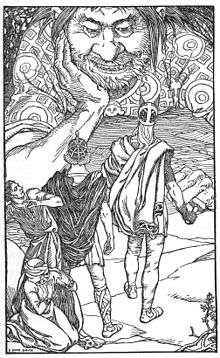
How Útgarða-Loki Outwitted Thor
The tale of how Thor was outwitted by the giant Útgarða-Loki (often anglicized as Utgard-Loki) was one of the best known myths of Norse mythology. Thor, wanting to go to Utgard, the stronghold of the jötunn, traveled with Asgard's trickster god, Loki. Utgard was guarded by Útgarða-Loki, a known master of trickery[7]:0.
Thor and Loki were traveling to Jötunheimr, accompanied by Þjálfi (anglicized as Thialfi) and his sister, Röskva. They arrived to a vast forest and continued their journey through the woods until dark. The four seek shelter for the night and discover an immense building. Finding shelter in a side room, they experience earthquakes through the night. The earthquakes cause all four to be fearful, except Thor, who grips his hammer in defense. The building turns out to be the huge glove of Skrýmir, who has been snoring throughout the night, causing what seemed to be earthquakes. The next night, all four sleep beneath an oak tree near Skrýmir in fear.[8]
Thor wakes up in the middle of the night, and a series of events occur where Thor twice attempts to destroy the sleeping Skrýmir with his hammer. Skrýmir awakes after each attempt, only to say that he detected an acorn falling on his head or that he wonders if bits of tree from the branches above have fallen on top of him. The second attempt awakes Skrýmir. Skrýmir gives them advice; if they are going to be cocky at the castle of Útgarðr it would be better for them to turn back now, for Útgarða-Loki's men there won't put up with it. Skrýmir throws his knapsack onto his back and abruptly goes into the forest and "there is no report that the Æsir expressed hope for a happy reunion".[9]
The four travelers continue their journey until midday. They find themselves facing a massive castle in an open area. The castle is so tall that they must bend their heads back to their spines to see above it. At the entrance to the castle is a shut gate, and Thor finds that he cannot open it. Struggling, all four squeeze through the bars of the gate, and continue to a large hall. Inside the great hall are two benches, where many generally large people sit on two benches. The four see Útgarða-Loki, the king of the castle, sitting.[10]
Útgarða-Loki says that no visitors are allowed to stay unless they can perform a feat. Loki, standing in the rear of the party, is the first to speak, claiming that he can eat faster than anyone. Loki competes with a being named Logi to consume a trencher full of meat but loses. Útgarða-Loki asks what feat the "young man" can perform, referring to Þjálfi. Þjálfi says that he will attempt to run a race against anyone Útgarða-Loki chooses. Útgarða-Loki says that this would be a fine feat yet that Þjálfi had better be good at running, for he is about to be put to the test. Útgarða-Loki and the group go outside to a level-grounded course.[11]
At the course, Útgarða-Loki calls for a small figure by the name of Hugi to compete with Þjálfi. The first race begins and Þjálfi runs, but Hugi runs to the end of the course and then back again to meet Þjálfi. Útgarða-Loki comments to Þjálfi that he will have to run faster than that, yet notes that he has never seen anyone who has come to his hall run faster than that. Þjálfi and Hugi run a second race. Þjálfi loses by an arrow-shot. Útgarða-Loki comments that Þjálfi has again ran a fine race but that he has no confidence that Þjálfi will be able to win a third. A third race between the two commences and Þjálfi again loses to Hugi. Everyone agrees that the contest between Þjálfi and Hugi has been decided.[12]
Thor agrees to compete in a drinking contest but after three immense gulps fails. Thor agrees to lift a large, gray cat in the hall but finds that it arches his back no matter what he does, and that he can only raise a single paw. Thor demands to fight someone in the hall, but the inhabitants say doing so would be demeaning, considering Thor's weakness. Útgarða-Loki then calls for his nurse Elli, an old woman. The two wrestle but the harder Thor struggles the more difficult the battle becomes. Thor is finally brought down to a single knee. Útgarða-Loki said to Thor that fighting anyone else would be pointless. Now late at night, Útgarða-Loki shows the group to their rooms and they are treated with hospitality.[13]
The next morning the group gets dressed and prepares to leave the keep. Útgarða-Loki appears, has his servants prepare a table, and they all merrily eat and drink. As they leave, Útgarða-Loki asks Thor how he thought he fared in the contests. Thor says that he is unable to say he did well, noting that he is particularly annoyed that Útgarða-Loki will now speak negatively about him. Útgarða-Loki, once the group has left his keep, points out that he hopes that they never return to it, for if he had an inkling of what he was dealing with he would never have allowed the group to enter in the first place. Útgarða-Loki reveals that all was not what it seemed to the group. Útgarða-Loki was in fact the immense Skrýmir, and that if the three blows Thor attempted to land had hit their mark, the first would have killed Skrýmir. In reality, Thor's blows were so powerful that they had resulted in three square valleys.[14]
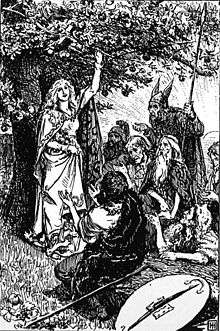
The contests, too, were an illusion. Útgarða-Loki reveals that Loki had actually competed against wildfire itself (Logi, Old Norse "flame"), Þjálfi had raced against thought (Hugi, Old Norse "thought"), Thor's drinking horn had actually reached to the ocean and with his drinks he lowered the ocean level (resulting in tides). The cat that Thor attempted to lift was in actuality the world serpent, Jörmungandr, and everyone was terrified when Thor was able to lift the paw of this "cat", for Thor had actually held the great serpent up to the sky. The old woman Thor wrestled was in fact old age (Elli, Old Norse "old age"), and there is no one that old age cannot bring down. Útgarða-Loki tells Thor that it would be better for "both sides" if they did not meet again. Upon hearing this, Thor takes hold of his hammer and swings it at Útgarða-Loki but he is gone and so is his castle. Only a wide landscape remains.[15]
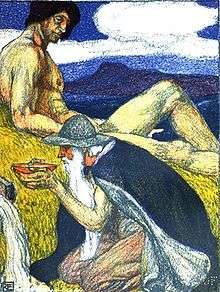
The Abduction of Iðunn
Unlike the Greek gods, the gods of Norse mythology were prone to aging. One day, the jötnar Þjazi, disguised as an eagle[6], swooped down and tricked Loki into bringing him Iðunn, the goddess who supplied magic apples to the gods and goddesses to stay young, in exchange for his life. Fearful of what the ancient giant would do to him, Loki agreed to the bargain.
As soon as Loki reached Asgard, he went straight to the orchard tended by Iðunn and her husband, Bragi[3]. He spun a lie of having found some apples in Midgard that looked the same as hers. Urging her to bring her own basket of apples to compare the two fruits, they departed for the world. When they crossed Bifrost, Þjazi swooped down and carried Iðunn away. The giant had locked her up in the highest tower in Þrymheimr. The gods and goddesses started aging. Summoning a meeting where every god was present except for Loki, the gods knew that Loki was up to no good. Upon finding the trickster god, he was ordered by Odin to bring back Iðunn and her apples or his life would be forfeited.
Fleeing in terror, Loki sought out Freyja to borrow her suit of falcon feathers. Loki flew to Þrymheimr, where he found Iðunn alone and unguarded. Loki turned the goddess and her basket of apples into a nut and held her in his claws. At this time, Þjazi, in his eagle disguise, was following them. Odin, who saw everything, immediately ordered the gods to build a bonfire at the gates of Asgard. When Þjazi reached the walls, his body caught on fire, and he fell to the ground. The gods slew him with no mercy. Releasing Iðunn from the spell, the gods and goddesses were once again youthful.
The Loss of Odin's Eye
Mimir was an ancient being, notorious for his unparalleled wisdom. His dwelling was Mímisbrunnr ("Mímir's well"), a sacred well situated under one of the roots of the tree Yggdrasil in Jötunheim[3]. Odin, wanting to gain immense knowledge and wisdom, consulted all living beings. He ventured to the land of the giants and asked for a drink from the well. Mimir, knowing the value of the water, refused unless Odin offered one of his eyes. The chief god was ready to pay any price for the wisdom he desired, and so he agreed to the deal and sacrificed his eye. The eye was then placed in Mímisbrunnr.
See also
- Geirröd - a giant who tried to kill Thor.
- Iðunn - a goddess who supplied the magic apples that kept the gods young.
- Jötunn - In Norse mythology, giant whose otherworldly homeland is Jötunheimr.
- Jotunheimen - the name of a large mountain range in Norway. The name Jotunheimen was first popularized by Aasmund Olafson Vinje, who spent much time in the area in the 1860s.
- Svipdagr - the human who wooed and won Menglöð.
- Thor - the god of thunder and storms. He wields a hammer called Mjölnir.
- Þrymheimr - In Norse mythology, the abode of Þjazi, located in Jötunheimr.
- Útgarða-Loki - In Norse mythology, ruler of the castle Útgarðr in Jötunheimr. He was the one who humiliated and defeated Thor, the god of thunder and storm.
References
- "Udgård". Nordiske guder. Den Store Danske. Religion og mystik (in Danish). Retrieved 11 July 2019.
- "Jotunhem". Nordisk familjebok / Uggleupplagan. Johan Kikare. pp. 193–194.
- Daly, Kathleen (1991). Norse Mythology A to Z: A Young Reader's Companion. New York, NY: Facts on File Inc. ISBN 0-8160-2150-3.
- Ashliman, D. L. (trans.) (2009). "The Lay of Thrym". The Lay of Thrym from Poetic Edda. Retrieved 6 February 2014.
- Carey, G. & Roberts, J. (Eds.) (1973). Mythology. New York, NY: Wiley Publishing Inc. ISBN 0-8220-0865-3
- Redmond, Shirley-Raye (2012). Norse Mythology. Farmington Hills, MI: Lucent Books. ISBN 978-1-4205-0717-1.
- Penguin Classics (2008). "Sagas of the Icelanders". New York, NY: Penguin Books.
- Faulkes (1995), pp. 38–40.
- Faulkes (1995), p. 40.
- Faulkes (1995), pp. 40–41.
- Faulkes (1995), p. 41.
- Faulkes (1995), p. 42.
- Faulkes (1995), pp. 42–44.
- Faulkes (1995), pp. 44–45.
- Faulkes (1995), pp. 45–46.
Sources
- Edda. Translated by Faulkes, Anthony. Everyman. 1995. ISBN 0-460-87616-3.
- Keary, Annie (1891). The Heroes of Asgard: Tales from Scandinavian Mythology. London: MacMillan & Co.CS1 maint: ref=harv (link)
- Lindow, John (2002). Norse Mythology: A Guide to Gods, Heroes, Rituals, and Beliefs. Oxford University Press. ISBN 978-0-19-515382-8.CS1 maint: ref=harv (link)
- Orchard, Andy (1997). Dictionary of Norse Myth and Legend. Cassell. ISBN 978-0-304-34520-5.CS1 maint: ref=harv (link)
- Simek, Rudolf (1993). Dictionary of Northern Mythology. D.S.Brewer. ISBN 0-85991-513-1.CS1 maint: ref=harv (link)
